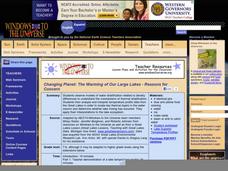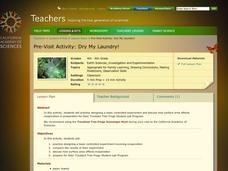Curated OER
Condensation Polymerization: Preparation of Nylon 6/6
Students participate in a lab activity in which they synthesize nylon 6/6, calculate the percent yield by mass, identify the polymer as thermoplastic or thermoset, and determine the melting point, density and end-product use of the polymer.
Curated OER
Insects?
Can you tell the difference between a bug and an insect? Aren't they the exact same thing? Let your learners explore, identify, classify, and document the differences they see in bugs and insects. The activity sheet suggests several...
Massachusetts Institute of Technology
Lego Atoms and Molecules: Chemical Reactions
Show young chemists what a chemical reaction looks like with two parts of a hands-on experiment. First, learners conduct a wet lab where they observe the reactants (baking soda and calcium chloride, with phenolsulfonphthalein) before,...
Beauty and Joy of Computing
Unsolvable and Undecidable Problems
Try as you might, some functions just cannot be computed. The lab introduces the class to the possibility of unsolvable problems. The fourth lesson in a series of seven begins with a logic problem, then progresses to looking at functions...
Chicago Botanic Garden
Understanding the Greenhouse Effect
The greenhouse effect is important, for without it, life on Earth would not exist. An activity that includes modeling the greenhouse effect and acting out the Earth's energy balance makes up the first part in a series of seven lessons....
Beyond Benign
Green"er" Precipitation Reaction
All sodium carbonate may not have the same amount of carbonate, but it should have the same percent. Learners write and balance an equation to predict the chemical reaction between sodium carbonate and zinc acetate. Through the lab...
National Nanotechnology Infrastructure Network
Nanotechnology Invention and Design: Phase Changes, Energy, and Crystals
What does it take to be considered a smart material? Learners investigate the properties of Nitinol, a smart material, through a hands-on lab activity. They examine the crystal lattice structure and the conditions required for Nitinol to...
Curated OER
Respiratory, Circulatory, and Urogenital Systems in the Rat
Here is a lesson which describes a lab activity in which a rat is dissected, and its heart is studied. The lesson has ample background information about three of the rats internal systems, and excellent lab sheets that support the...
Jefferson Lab
The Shape of Things
Here is an interesting science lesson plan/activity which has learners working in groups in order to simulate experiments done at the Jefferson Science Lab. In this one, groups use a pie tin, a Hula Hoops, a marble, and a magic marker to...
Curated OER
Oobleck
Here is a good lesson which aptly describes how to do the classic "Oobleck" lab with your young scientists. Unfortunately, the "Oobleck Investigation Sheet" in the plan doesn't open. However, this is a very clear description about how to...
Curated OER
Simple Machines IV - Levers
The lever is an everyday simple machine. Youngsters learn the principles of levers and explore their many uses. Groups of pupils perform a simple lab where they lift objects with a fulcrum while placing the load in a variety of...
Curated OER
Investigation of Crystallinity in Polymeric Materials
A kaleidoscope is constructed using polarizing polymer paper and then low-density polyethylene, high-density polyethylene, and polypropylene are all melted onto individual glass slides and examined through a microscope. The intent is to...
Curated OER
Elastomers: The Best Bungee Cord
Students examine elastomeric polymers in a lab activity in which they design a bungee cord. Students must determine the tensile strength, percent elongation, and plot stress versus strain graphs for their experiments on rubber bands...
Curated OER
Heating and Cooling Curves
Students experiment with a pure substance and a phase change. In this heating and cooling curves lesson plan, students study the effects of heating and cooling a pure substance to observe a phase change. They determine both the melting...
Curated OER
2003 U.S. National Chemistry Olympiad Part III
In this chemistry Olympiad worksheet, pupils are given 2 lab problems to work on. They must explain their experiment they would carry out, show their data and write their results and conclusions of the lab and the process.
Curated OER
Acid-Base Indicators
The first two pages provide a chart to complete with results of a lab test using different solutions and indicators. The data analysis questions will help your students understand the concentrations of the solutions and how they affect...
Curated OER
Thirsty Rocks: Please "Porous" a Drink!
A simple activity goes a long way in demonstrating the property of porosity to your rock hounds. They will mass a specimen of dry sandstone and then soak it in a pre-measured amount of water. After seven minutes, they once again measure...
Curated OER
Changing Planet: The Warming of Our Large Lakes - Reasons for Concern
Another A+ lesson on the impact of climate change comes to you from the National Earth Science Teachers Association. In this installment, learners model the stratification of water in lakes due to temperature differences. The lab also...
Curated OER
Aerobic/Anaerobic Respiration
Both aerobic and anerobic respiration are introduced in this succinct PowerPoint. The chemical equations for both are included. The last slides give instructions for a lab activity in which pupils use a gas sensor to measure the...
California Academy of Science
Dry My Laundry!
Meant to be a pre-field trip lesson, this can also serve as a cute and simple activity to use when your little ones are learning about evaporation or surface area. The children cut tiny t-shirts out of paper towel material, wet them, and...
Mrs. Burgess
End of the Year Geometry Projects
Geometry students will be ecstatic about these engaging and enlightening end-of-the-year projects! Types of project ideas include interviewing a geometer, an ABCs of geometry poster, an engineering lab report, and origami work.
Benjamin Franklin High School
Saxon Math: Algebra 2 (Section 3)
In this third of a twelve-part series, the focus moves from using matrices to solving systems of equations with substitution and elimination, including more than two dimensions and variables in equations, and analyzing statistical data....
University of California
Hot! Hot! Hot!
Calories are not tiny creatures that sew your clothes tighter every night, but what are they? A science lesson, presented at multiple levels, has learners experiment with heat, heat transfer, and graph the function over time. It also...
Code.org
APIs and Using Functions with Parameters
Introduce your class to the API, a reference guide that lists and explains the functionality of programming language. Using JavaScript, individuals draw complex designs that require additional commands and parameters defined in the API...
Other popular searches
- Lab Safety
- Biology Lab
- Diffusion and Osmosis Lab
- Lab Equipment
- Science Lab Safety Rules
- Science Lab Safety
- Density Lab
- Photosynthesis Lab
- Lab Report
- Scientific Method Lab
- Biology Lab Photosynthesis
- Microscope Lab

























